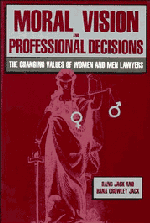Book contents
- Frontmatter
- Contents
- Preface
- Acknowledgments
- 1 Care and rights: two ways of perceiving the world
- 2 The lawyer's role: partisanship, neutrality, and moral distance
- 3 Personal morality: the orientation of lawyers toward rights and care
- 4 Personal morality and attorney role: changing perceptions of professional obligation
- 5 Women lawyers: archetype and alternatives
- 6 Toward a more morally responsive advocate
- Appendix I Coding Manual
- Appendix II Figures and tables
- Notes
- Bibliography
- Index
6 - Toward a more morally responsive advocate
Published online by Cambridge University Press: 16 September 2009
- Frontmatter
- Contents
- Preface
- Acknowledgments
- 1 Care and rights: two ways of perceiving the world
- 2 The lawyer's role: partisanship, neutrality, and moral distance
- 3 Personal morality: the orientation of lawyers toward rights and care
- 4 Personal morality and attorney role: changing perceptions of professional obligation
- 5 Women lawyers: archetype and alternatives
- 6 Toward a more morally responsive advocate
- Appendix I Coding Manual
- Appendix II Figures and tables
- Notes
- Bibliography
- Index
Summary
In 1927, Felix Frankfurter, then a professor at Harvard Law School and later a justice of the United States Supreme Court, wrote to a Mr. Rosenwald regarding lawyers, law schools, and American society. For reasons not made clear, Frankfurter sought to counter Rosenwald's “skepticism as to the usefulness of legal research and legal education in furthering [the] purposes of a healthy and good American society.” Hoping to enlist Rosenwald's support for Harvard Law School and for the peace, justice, and prosperity that he associated with Harvard-trained lawyers, Frankfurter began his syllogistic response with: “The great, big fact about American national life which differentiates it from that of all Western countries (and of course, also, Eastern countries) is the part played in our affairs by lawyers. … ours is a legal society.” And what kind of lawyers do we need to meet the lofty and diverse challenges that Frankfurter assigns to them? “We must have law and lawyers … that are sensitive to the feelings and needs of the various ingredients that make the sum total of the American Nation, lawyers that are hard-headed without being hard, lawyers that are wise rather than smart.” Given the centrality of law and lawyers, how do we get these people “who have a wide outlook and an intimate familiarity with the conditions of modern life”? Frankfurter answers his own question: “In the last analysis, the law is what the lawyers are.
- Type
- Chapter
- Information
- Moral Vision and Professional DecisionsThe Changing Values of Women and Men Lawyers, pp. 156 - 171Publisher: Cambridge University PressPrint publication year: 1989



